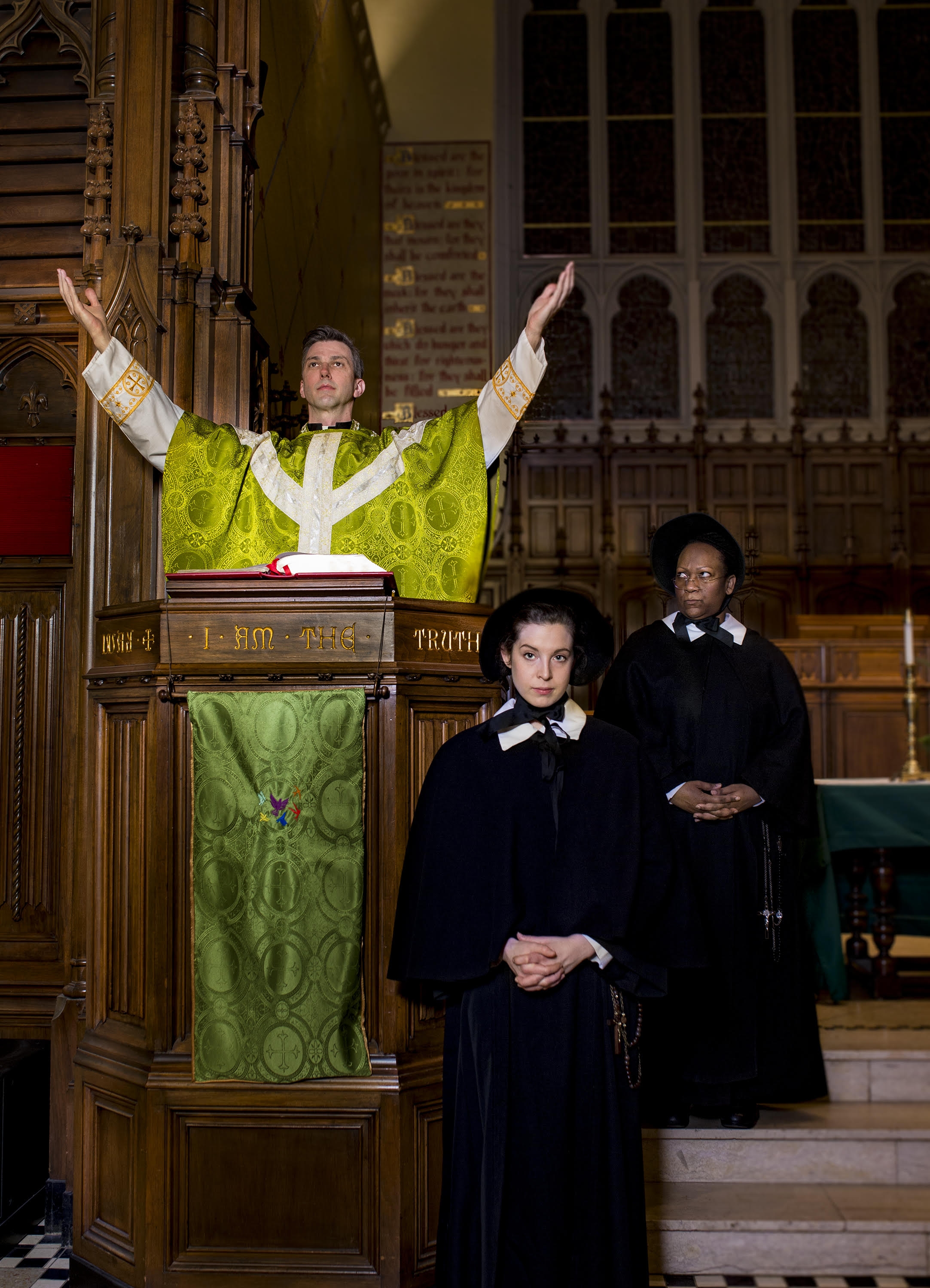When John Patrick Shanley’s Pulitzer and Tony Award winning drama “Doubt: A Parable” came out amid the first of Catholic priest sex abuse revelations 15 years ago, it was powerful and shocking. Today, it is every bit as powerful and gripping, not just because the allegations, the crimes, the cover-ups from within the Church have kept coming; but because it is such a beautifully crafted play that speaks to fundamental emotional truths and fears more profound, even, than the Catholic Church.
And at Farmers Alley, in the hands of Director D. Terry Williams, “Doubt” is riveting.
In the play, it is 1964 in the Bronx, the year after President Kennedy was assassinated, and two years after the Second Vatican Council opened, setting in motion dramatic changes to the Church. The world is in flux, and Sister Aloysius, principal of the parish school, the kind of stern pre-Vatican II nun legions of school children feared, believes in order, discipline and stability as the antidote. Father Flynn is the young, handsome, charming new parish priest who believes he can draw the best out of the parishioners and the students whom he coaches basketball by befriending them and making the church and its school more warm and welcoming.
How could these two not eventually come to blows?
Sister Aloysius suspects Father Flynn of inappropriate behavior with one of the altar boys, a young man who also happens to be the only African American in the school. Given the Church’s hierarchy, Sister Aloysius opts to confront him directly rather than bring the complaint to her supervisor. She also doesn’t have solid proof of any wrongdoing.
Sister James, a young, innocent teacher who is naturally more aligned with Father Flynn’s approach, gets reproached by Sister Aloysius for her classroom style, and then caught up in the conflict between her boss and her priest.
What transpires over the 80-minute play is psychologically thrilling, and though there isn’t much action in the script, mostly dialogue and monologues, this production moves. The action unfolds in three spaces: Sister Aloysius’s office, the pulpit and the garden, which also doubles as the gym.
These spaces are distinct and visually appealing because of Dan Guyette’s scenic design in collaboration with Lanford J. Potts’ lighting design and Jay Ortega’s sound design. Wind, birds, bouncing basketballs, the pattern of dead leaves and the colorful warm glow of the sun streaming through stained glass windows all create rich, sensual layers to support this dark conflict.
D. Terry Williams’ direction shows great restraint, as do the performances, all of which is in keeping with the script, which is remarkably not heavy handed. And the power of silence, Williams’ use of the pregnant pause is poignant. The audience is never told what to think, and is indeed left in doubt — not just about who’s right or what’s actually happened, but why we may side one way or the other. It’s brilliant.
As are the performers. Dwandra Nickole Lampkin is fiercely convincing as the severe and unrelenting Sister Aloysius, and Andy Hoff’s Father Flynn is so charming, likable and persuasive, they’re a terrific matchup, and their scenes dynamic. The only way this casting could have more layers of meaning is if Lampkin were much older than Hoff, even more clearly representing the old guard. But as is, it works beautifully.
However, the most crushing scene comes between Lampkin and Julianne Howe-Bouwens, as Mrs. Muller, the boy’s mother. Regardless of whether or not her son has been molested by Father Flynn, there’s little doubt about the evils of racism and the choices a mother must make for her son to have a chance.
And Tamsen Glaser’s Sister James is a wonderful barometer, so committed and yet so lost, as to what’s right.
Which is undoubtedly where the audience ends up — puzzling over our own assumptions, our own reasons for believing and questioning that which we do — and do not. This is perhaps the best kind of theater: that which makes you think, makes you feel, and leaves you thinking and feeling and questioning long after the show has ended.
Doubt, A Parable
Farmers Alley Theatre
Feb. 8-24
farmersalleytheatre.com





